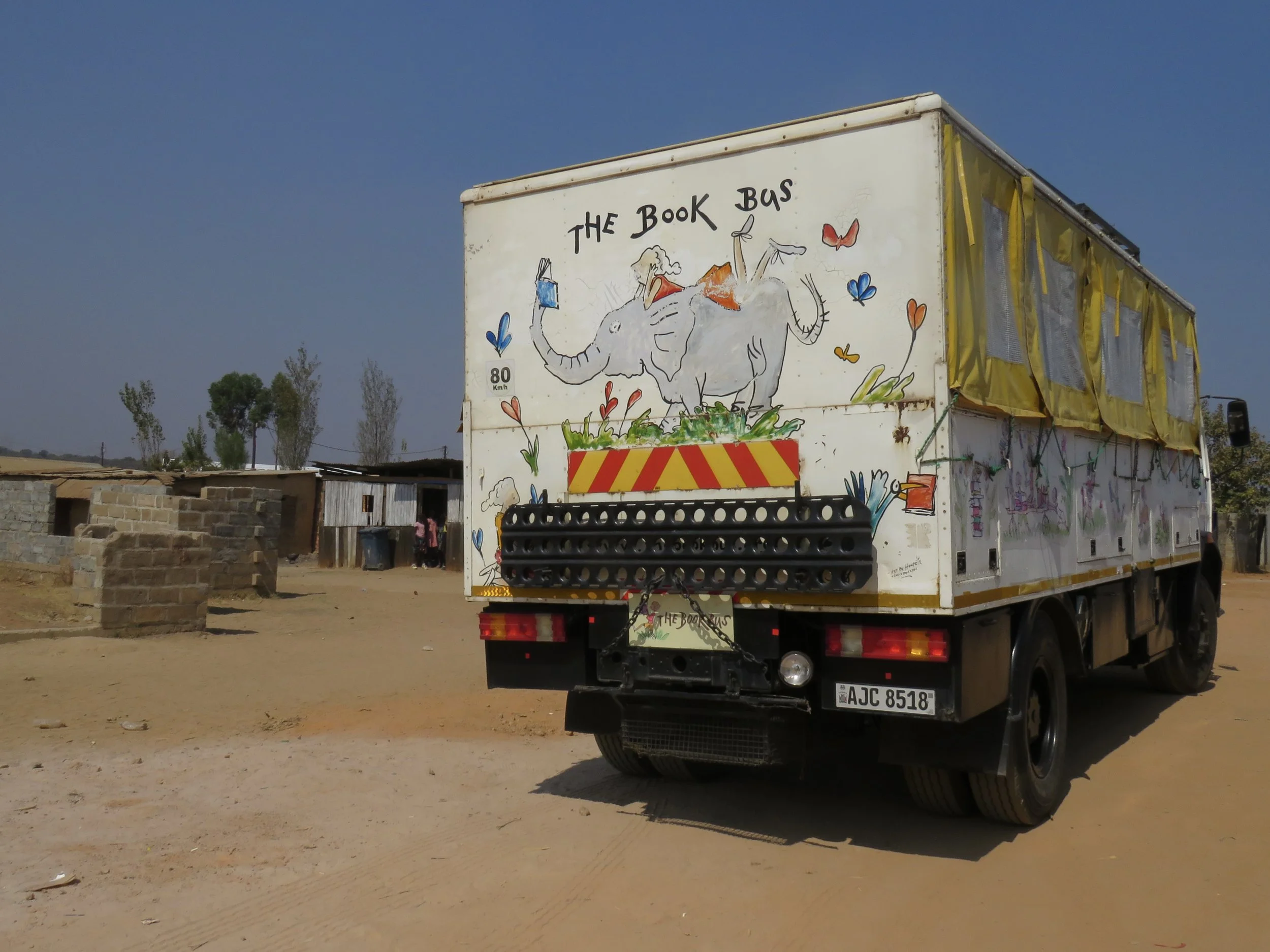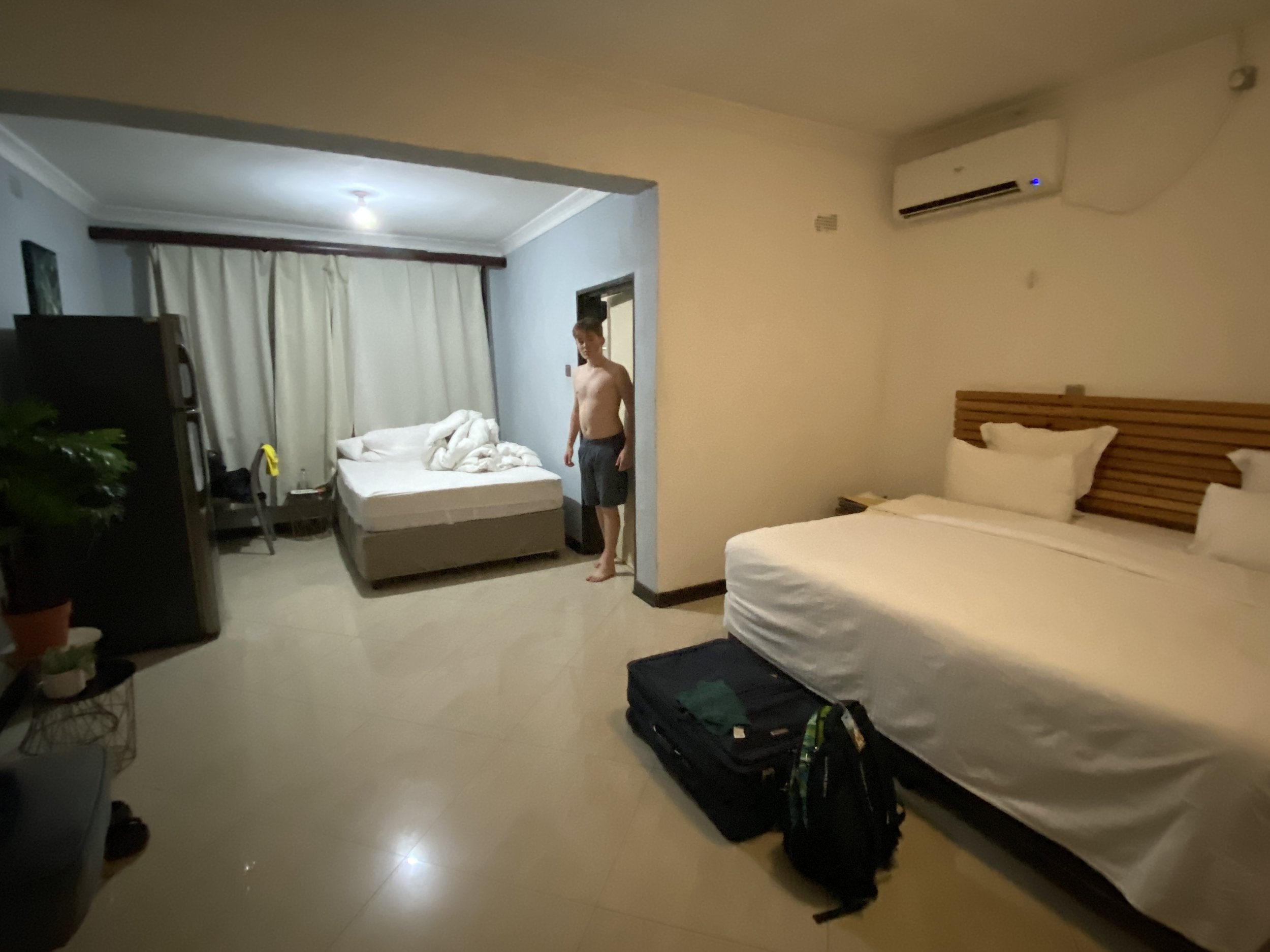Serene Gardens, Kitwe
After a long online search, using Google maps for close-ups of the area where The Book Bus is located, I booked our accommodations in Kitwe where we would volunteer for two weeks. Kitwe is a mining city in northern Zambia, located in the Copperbelt, not far south from the border with Congo. Kitwe is a busy city and while the mines must be profitable, the average population is poor. It’s a very industrial area, no African wildlife except for small animals and birds.
We eat all of our meals in the garden/restaurant.
Serene Gardens hotel turned out to be right behind the Book Bus office and in a quiet, shaded part of town. It is surrounded by a wall with a gate, then a parking lot and you enter to the office. The building is a ‘donut’ with a lovely garden in the centre, surrounded by rooms, restaurant and kitchen. We had two large rooms with a fair bit of space, comfy beds. Each room has a fridge and a kettle and our own bathroom.
The staff is what makes this place special: they treat us like family, show us photos of their kids and go out of their way to help us.
We had big bedrooms.
Zambia has mostly hydro-electricity. But it also has the worst drought in many years and have not seen rain in over two years. Hence, the dams that produce the nation’s power, are shut down for 12 hour power outages nationwide. (A month later that turned to 17 hour power outages every day across the country).
The hotel has a generator which starts and stops with loud grinding noises once in awhile. But basically we have power from 6 AM to about 9 AM, then a while around lunch time and again from 5 PM until about 9 PM. No power also means no water pump, so we use the handheld shower to dribble some cold water on ourselves to clean up. And no power means no AC so we often wake up hot…
Aidan preepares activities for the next day.
On our very first day of working with The Book Bus, we get picked up to drive around the corner to the office with our gigantic suitcases full of books and clothing.
We get a tour of the offices and grounds of the Book Bus. Several of the men who work here, live in small shacks on the grounds. Edward, the driver, keeps chickens and they grow mangoes and papayas. There were several cats and a slew of puppies, which the boys love. Inside the building is cheerful with lots of bookshelves and posters about literacy and reading.
Prepping for our reading activities.
We meet the few staff members and a keen team of local volunteers - most of them university students eager to get work experience and help children discover the joy of reading. One bright young man tells us that thanks to The Book Bus, he learned to read. Now he is volunteering to help other young boys to learn to read and share books with them - a rare commodity in many schools.
By a termite hill.
We had expected to be told what to do each day, but discover that they want us to take the initiative. Together with the team, we come up with lesson plans for books, activities, games and crafts for the week all based on the theme of global warming - for two schools a day.
My grandsons, Nico (14) and Aidan (12) were impressive as they introduced themselves and then in coming up with ideas for crafts and games - showing us how to play a game or how to do a dance. They have great ideas and share things they enjoyed at their own school. I can’t wait to see them working with the keen little kids we will meet here.
Back at the hotel, Hannah (the mom) and I spent the afternoon cutting paper for crafts and preparing activities while the boys enjoy the icy cold if somewhat dubious looking pool at the hotel.
Soon it’s finally time for our first day at schools. Up early, a cold shower, quick breakfast and off we go in our new bright yellow Book Bus shirts. We get picked up in the Book Bus van and drive down dusty, corrugated dirt roads. Out of the city and into the countryside. Long lines of people walk a long the red sand road towards the city to sell their produce, charcoal or cloths. Women with babies in slings on their back walk tall as they carry large baskets of bananas on their heads, men push old bicycles loaded with bales of charcoal or kindling. Barefooted children run along, waving at our van.
We drive along this road, most of it unpaved, every day to reach our morning school.
After an hour and a half we arrive at our morning school. The children, who have walked for a long time to come to school, are lined up according to size and sing us a welcome song. We pile out of the van, spread rice mats on the dirt of the school yard, in the shade of the brick building and bring out our bins of books and activities. The kids are not shy. They crowd around us, want to hold our hands and help carry stuff. These lovely, happy kids live about 9 KM outside Kitwe but most of them have never been to the city.
We start each day with songs, games and dances.
The students are divided into age groups. Hannah and Aidan and two other volunteers work with the little ones. Nico and I, and some of wonderful young men from our team, work with the older students. We’re going to read a chapter book with them, every day this week, about protecting and preserving lakes and rivers. Nico starts off with explaining some key words.
“Who can read this word?” he asks, holding up a sign with a word printed on it. Eager hands shoot up as the kids try. Bemba is their first language but they all speak English as well. Then Nico explains the meaning of the word before moving on to the next key word.
This is inside the school, built from bricks, but we never use the building. We meet outside.
As I read a chapter, fingers move along and lips mumble the text with me.
Then the young men of our team lead a discussion on the story - “did you understand what was happening? Why do we need to protect our lakes? Why can’t we fish illegally?” and so on.
After our intense reading session it’s time to move. We get up from our mats and Nico teaches everyone the ‘macarena’! Then we play a game - ‘Who Am I’ with headbands saying ‘a fish’, ‘a water drop’, etc. They love it!
And the kids teach us words in their language: ‘Moo li shanee’ means hello, how are you. ‘Na toh tellah’ means thank you.
After several rambunctious songs and dances, it’s time to pack up and drive back the same way we came - past single tracks leading off into the bush, past the place where bricks are baked for building, past a cardboard shack pub, past many people walking, selling tomatoes and sitting on hunches along the dirt road. Back to Kitwe with its busy traffic. Back to our Serene Gardens for a quick lunch and a rest.
And then it’s off to the afternoon school where we see poverty and joy go hand in hand. More on that adventure in our next blog!
RESOURCES:
In case you missed it, this is the fundraiser we started: https://www.gofundme.com/f/a-meter-of-books-will-make-miles-of-difference that will benefit this wonderful UK based NGO.











